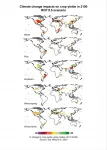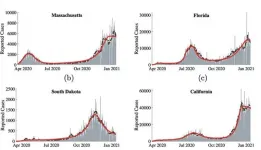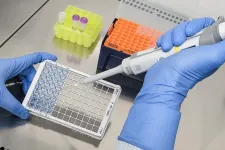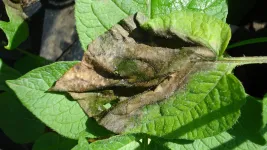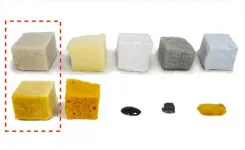(Press-News.org) On average the earliest memories that people can recall point back to when they were just two-and-a-half years old, a new study suggests.
The findings, published in peer-reviewed journal Memory, pushes back the previous conclusions of the average age of earliest memories by a whole year.
They are presented in a new 21-year study, which followed on from a review of already-existing data.
"When one's earliest memory occurs, it is a moving target rather than being a single static memory," explains childhood amnesia expert and lead author Dr Carole Peterson, from Memorial University of Newfoundland.
"Thus, what many people provide when asked for their earliest memory is not a boundary or watershed beginning, before which there are no memories. Rather, there seems to be a pool of potential memories from which both adults and children sample.
"And, we believe people remember a lot from age two that they don't realize they do.
"That's for two reasons. First, it's very easy to get people to remember earlier memories simply by asking them what their earliest memory is, and then asking them for a few more. Then they start recalling even earlier memories - sometimes up to a full year earlier. It's like priming a pump; once you get them started its self-prompting.
"Secondly, we've documented those early memories are systematically misdated. Over and over again we find people think they were older than they actually were in their early memories."
For more than 20 years Dr Peterson has conducted studies on memory, with a particular focus on the ability of children and adults to recall their earliest years.
This latest research reviewed 10 of her research articles on childhood amnesia followed by analyses of both published and unpublished data collected in Dr Peterson's laboratory since 1999. It featured a total of 992 participants, and memories of 697 participants were then compared to the recollections of their parents.
Overall, it shows that children's earliest memories come before when they think it happened, as confirmed by their parents.
In some of the research reviewed by Peterson, the evidence to move our potential memory clock is "compelling". For example, when reviewing a study which interviewed children after two and eight years had passed since their earliest memory they were able to recall the same memory, however in the subsequent interviews gave a later age as to when they occurred.
"Eight years later many believed they were a full year older. So, the children, as they age, keep moving how old they thought they were at the time of those early memories," says Dr Peterson, from the Department of Psychology at Memorial University.
And she believes that the finding is due to something in memory dating called 'telescoping'.
"When you look at things that happened long ago, it's like looking through a lens.
"The more remote a memory is, the telescoping effect makes you see it as closer. It turns out they move their earliest memory forward a year to about three and a half years of age. But we found that when the child or adult is remembering events from age four and up, this doesn't happen."
She says, after combing through all of the data, it clearly demonstrates people remember a lot more of their early childhood and a lot farther back than they think they do, and it's relatively easy to help them access those memories.
"When you look at one study, sometimes things don't become clear, but when you start putting together study after study and they all come up with the same conclusions, it becomes pretty convincing."
It's this lack of clarity which Dr Peterson states is a limitation of the research and, indeed, all research done to-date in the subject area.
"What is needed now in childhood amnesia research are independently confirmed or documented external dates against which personally derived dates can be compared, as this would prevent telescoping errors and potential dating errors by parents," Dr Peterson says.
Such research - using verified dating - is currently ongoing both in her laboratory and elsewhere to further confirm the answer to this long-debated question.
INFORMATION:
Shifts in weather patterns induced by climate change will increase extreme heat and reduce rainfall across major crop growing regions, with impacts on agricultural production. Will this trigger a decline in the supply of calories needed to sustain the world's growing population?
According to a study published in the Journal of Environmental Economics and Management, global calorie supplies are subject to continuing or even increasing vulnerability to climate change. Climate change could reduce global crop yields by 10% by mid-century and 25% by century's end, under a vigorous warming scenario, if farmers cannot adapt better than they did historically. ...
Every day, around 15 000 children under the age of five die from causes that could have been prevented.
But the children of highly educated parents survive more often than others. This statistic applies worldwide, according to a newly published sweeping systematic review in The Lancet.
The mother's level of education is particularly important for her children's survival.
"One year of extra education for the mother is associated with an approximately three per cent reduction in mortality on average," says Professor Terje Andreas Eikemo at the Norwegian University of Science ...
PROVIDENCE, R.I. [Brown University] -- By adding behavioral components to an infectious disease model, Brown University researchers have developed a new modeling approach that captures the peaks and valleys in new COVID-19 cases seen over the past 16 months.
The approach, published in the journal Scientific Reports, could be useful in forecasting the future trends in the current pandemic, as well as in predicting the course of future ones.
"We know that people's behavior matters in terms of how an infection is spread," said Vikas Srivastava, an assistant professor of ...
Tsukuba, Japan - To study the immune system in human health and disease, scientists commonly use the genetic manipulation of mouse hematopoietic stem and progenitor cells (HSPCs) as a powerful model system. These studies have been extremely valuable in the fight against a number of human diseases. However, the current procedures are complex, time-consuming, and expensive.
In a new study published in NATURE COMMUNICATIONS, researchers at the University of Tsukuba have developed a novel technique that has the potential to overcome the limitations associated with these models, which are known as bone marrow (BM) chimeric mice. This system allows scientists to observe and investigate how ...
SARS-CoV-2 outbreaks involving care homes with fully vaccinated residents have been reported across Germany. In order to gain a better understanding of this phenomenon, a team of researchers from Charité - Universitätsmedizin Berlin used an outbreak at a Berlin-based facility to analyze virus-related data and study the immune responses of elderly residents following vaccination. The researchers' data, which have been published in Emerging Infectious Diseases*, confirm vaccine effectiveness in the elderly. However, they also indicate a delayed and slightly reduced immune response. In light of their findings, the researchers emphasize the need to vaccinate both caregivers and close contacts in order to better protect this high-risk group.
The BioNTech/Pfizer ...
Research combining systematic observations with cosmological simulations has found that, surprisingly, black holes can help certain galaxies form new stars. On scales of galaxies, the role of supermassive black holes for star formation had previously been seen as destructive - active black holes can strip galaxies of the gas that galaxies need to form new stars. The new results, published in the journal Nature, showcase situations where active black holes can, instead, "clear the way" for galaxies that orbit inside galaxy groups or clusters, keeping those galaxies from having their star formation disrupted as they fly through the surrounding intergalactic gas.
Active black holes are primarily thought to have a destructive influence on their surroundings. As they blast ...
At a classical second-order phase transition, condensed matter systems acquire long-range order upon cooling below the transition temperature, and the properties near the transition are driven by thermal fluctuations. These behaviors have been long explained by the Landau theory of phase transitions, which leads to the notion of universality, whereby systems with very different microscopic constituents exhibit certain universal macroscopic behaviors close to a phase transition. Some condensed matter systems however can be tuned so that the phase transition is suppressed to zero temperature at a quantum critical point (QCP), where the behaviors are no longer driven by thermal fluctuations, but by quantum fluctuations arising as a consequence of Heisenberg's uncertainty principle.
Heavy ...
North Carolina State University researchers continue to track the evolution of different strains of the plant pathogen that caused the Irish potato famine in the 1840s, which set down roots in the United States before attacking Europe.
NC State plant pathologists studied the genomes of about 140 pathogen samples - historic and modern - from 37 countries on six continents to track the evolution of differing strains of Phytophthora infestans, a major cause of late-blight disease on potato and tomato plants.
The study, published in Scientific Reports, shows that the historic lineage called FAM-1 was found in ...
Human papillomavirus (HPV) vaccines applied in national vaccination programs protect against most cancers associated with oncogenic, high-risk (hr) HPV types. Two recent studies demonstrate the impact of gender-neutral HPV vaccination in the overall protection against hrHPV infections already with low vaccination coverage.
More than 30 000 12-15-year-old Finnish girls and boys participated in a community-randomized trial that evaluated the impact of gender-neutral vs. girls-only HPV16/18 vaccination in the two school years of 2007-2008 and 2008-2009 in 33 communities. To evaluate the occurrence of HPV infections, pre- and post-vaccination serum samples collected in the same communities were used to measure the antibodies against ...
A new high-performance plastic foam developed from whey proteins can withstand extreme heat better than many common thermoplastics made from petroleum. A research team in Sweden reports that the material, which may be used for example in catalysts for cars, fuel filters or packaging foam, actually improves its mechanical performance after days of exposure to high temperatures.
Reporting in Advanced Sustainable Systems, researchers from KTH Royal Institute of Technology in Stockholm say the research opens the door to using protein-based foam materials in potentially tough environments, such as filtration, ...
